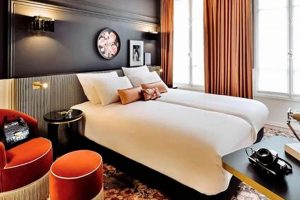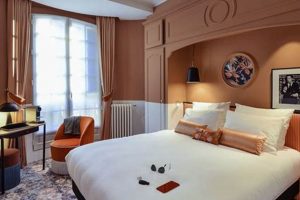This establishment represents a confluence of advantageous factors for travelers. It is a lodging option characterized by its brand affiliation, proximity to a major transportation hub, and situation near significant cultural landmarks. The combination facilitates ease of access and offers immediate immersion in the city’s vibrant environment.
Its relevance stems from several key advantages. Situated near a major train station, it provides convenience for individuals arriving in or departing from the city. Its location allows for efficient navigation to other destinations. Furthermore, being within walking distance of a renowned opera house and a historical district affords guests immediate access to cultural experiences and historical context. These factors contribute to a potentially enriched travel experience.
The following sections will delve deeper into the specific amenities, services, and locational advantages of this specific hospitality venue, providing a more comprehensive understanding of what it offers potential guests and how it compares to other available options in the area. We will consider aspects such as room configurations, dining options, and accessibility features, among other pertinent factors.
Accommodation Considerations
This section offers guidance for prospective guests, ensuring an informed and optimal experience.
Tip 1: Secure Reservations Well in Advance: Given its strategic location, particularly during peak travel seasons and event dates, availability is often limited. Early booking mitigates potential disappointment.
Tip 2: Clarify Room Specifications: Various room types are offered. Prior to finalizing a reservation, confirm specific requirements such as bed configuration (double or twin), accessibility features, and views to ensure accommodation suitability.
Tip 3: Investigate Transportation Options: While conveniently located near a major train station, alternative transportation methods, such as the metro or taxis, may be more expedient for certain destinations within the city. Research route planning for optimal travel efficiency.
Tip 4: Explore Local Dining Establishments: Beyond the hotel’s dining offerings, numerous restaurants and cafes are located in the surrounding area. Venture out to experience diverse culinary options. Prioritize establishments with positive reviews and reservations when necessary.
Tip 5: Verify Check-In/Check-Out Policies: Adherence to established check-in and check-out times is crucial. Inquire about early check-in or late check-out possibilities, understanding that such requests are subject to availability and may incur additional charges.
Tip 6: Utilize Concierge Services: Concierge services are available to assist with various needs, including restaurant reservations, tour arrangements, and transportation assistance. Leverage their local expertise to enhance the overall experience.
Tip 7: Confirm Amenities: Prior to arrival, verify the availability of specific amenities crucial to individual needs. Examples include Wi-Fi access, gym facilities, or business center services.
Diligent pre-trip planning, incorporating these considerations, enhances the probability of a seamless and gratifying stay. Awareness of these factors allows for proactive mitigation of potential inconveniences.
The subsequent sections will address specific aspects of the surrounding area, delving into the cultural and historical significance of nearby landmarks and providing further insights into maximizing the visit.
1. Strategic Proximity
The geographic placement of the establishment significantly dictates its value proposition. The proximity to Gare de Lyon, a major railway terminus, directly impacts accessibility for travelers arriving in and departing from the city. This location eliminates or reduces the need for extended transfers, saving time and expense. The adjacency to the Opera Bastille, a significant cultural landmark, provides immediate access to performances and cultural events, enhancing the overall guest experience. Thus, the strategic proximity is not merely a feature; it is a primary driver of convenience and cultural immersion.
Furthermore, the location facilitates access to diverse amenities and services beyond the immediate vicinity. The surrounding area offers a range of dining establishments, retail outlets, and business services. This enhances its suitability for both leisure and business travelers. Consider, for example, a business traveler attending a conference who requires readily available transport to the event location or a tourist wanting to attend a show at the Opera without the hassle of long commutes. Strategic proximity directly addresses these needs.
In summary, the strategic proximity constitutes a central component of its operational value. It is a tangible attribute influencing travel convenience, cultural engagement, and access to essential services. Challenges include managing high demand due to location and maintaining service quality amidst increased traffic. However, the inherent advantages of the location provide a sustainable competitive edge within the hospitality sector of Paris.
2. Brand Reputation
Brand reputation, in the context of the aforementioned establishment, significantly influences customer expectations and perceived value. The affiliation with a recognized hotel chain establishes a baseline expectation of service quality and operational standards, impacting prospective guests’ decision-making processes. This association either attracts or deters potential clientele based on pre-existing perceptions of the brand.
- Consistency of Service Delivery
A core component of brand reputation involves the consistent delivery of services across all properties affiliated with the brand. Guests anticipate a standardized level of cleanliness, efficiency in service, and adherence to specific operational protocols. Failure to meet these expectations at any one location can negatively impact the overall brand image and erode customer trust, especially in a competitive market like Paris.
- Loyalty Program Implications
Many hotel chains offer loyalty programs that reward frequent guests with points, upgrades, or other benefits. Brand reputation plays a critical role in attracting and retaining members within these programs. Positive experiences at the establishment reinforce loyalty, encouraging repeat bookings and promoting positive word-of-mouth referrals. Conversely, negative encounters can lead to program attrition and damage brand perception.
- Online Reviews and Ratings
In the digital age, online reviews and ratings are pivotal in shaping brand reputation. Potential guests frequently consult review platforms before making booking decisions. The establishment’s online presence directly reflects the overall brand sentiment, influencing booking rates and perceived value. Positive reviews serve as endorsements of the brand promise, while negative feedback can deter potential customers.
- Competitive Differentiation
Brand reputation serves as a critical tool for differentiating the establishment from its competitors within the Paris hospitality market. A strong brand identity can provide a competitive advantage, attracting guests seeking a specific level of service or aesthetic. However, merely relying on brand recognition is insufficient; the establishment must continually strive to meet and exceed guest expectations to maintain its competitive edge.
These facets collectively illustrate the complex relationship between brand reputation and the specific hospitality offering. While association provides an initial advantage, sustained success requires consistent service delivery, active engagement with loyalty programs, diligent management of online reputation, and a continuous commitment to differentiating the hotel within a competitive landscape.
3. Amenity Provision
The availability and quality of amenities significantly impact the guest experience at the hotel. These offerings, both standard and specialized, influence overall satisfaction and contribute to the perceived value proposition. The following points detail specific facets of amenity provision and their implications for guests.
- In-Room Technologies
The presence of functional and up-to-date in-room technologies, such as high-speed internet access, smart televisions with streaming capabilities, and user-friendly climate control systems, is increasingly critical. These features cater to both business and leisure travelers, enhancing convenience and productivity. The absence of reliable technology can detract significantly from the guest experience, especially for those who rely on it for work or entertainment.
- Dining Options
Provision of on-site dining options, including breakfast service, restaurant facilities, and room service, impacts guest convenience and satisfaction. The quality and variety of food offerings, the ambiance of dining areas, and the efficiency of service contribute to the overall perception. Limited or subpar dining options may necessitate off-site excursions, potentially inconveniencing guests and affecting their perception of the hotel’s overall value.
- Wellness and Fitness Facilities
The availability of wellness amenities, such as a fitness center, spa services, or swimming pool, caters to health-conscious travelers and those seeking relaxation. These features offer opportunities for exercise and rejuvenation, enhancing the overall stay. The absence of such facilities may deter guests who prioritize health and wellness during their travels.
- Business Services
For business travelers, the provision of essential business services, such as a business center with printing and photocopying capabilities, meeting rooms, and reliable internet access, is crucial. These facilities enable guests to conduct work effectively and efficiently while away from their offices. The absence of these services can hinder productivity and necessitate reliance on external providers, potentially incurring additional costs.
These diverse aspects of amenity provision collectively define the hotel’s capacity to cater to varying guest needs and preferences. A well-considered and effectively maintained array of amenities enhances guest satisfaction, contributing positively to overall brand perception and encouraging repeat bookings. Conversely, deficiencies in amenity provision can negatively impact the guest experience, potentially diminishing the hotel’s competitive advantage within the Paris hospitality sector.
4. Accessibility
Accessibility, in the context of this particular hotel, manifests as a multifaceted attribute influencing both physical and logistical convenience for its clientele. Its proximity to Gare de Lyon directly translates to ease of transport for rail travelers, eliminating the complexities associated with navigating unfamiliar urban environments upon arrival or departure. This accessibility extends beyond rail transport. The area is served by multiple metro lines, facilitating connections to various points within the city and its periphery. This interconnectedness reduces reliance on taxis or private vehicles, potentially lowering transportation costs and mitigating travel-related stress. Such factors make the establishment a viable option for diverse traveler segments, including those with mobility constraints or those prioritizing efficient urban navigation.
Moreover, accessibility encompasses not only transport but also the physical accommodations offered within the hotel itself. The presence of ramps, elevators, and accessible room configurations directly addresses the needs of individuals with disabilities, ensuring inclusivity and compliance with accessibility standards. The absence of these features would significantly limit the hotel’s appeal and potentially violate legal requirements regarding accessibility. This focus on inclusivity extends to the surrounding area, with accessible sidewalks and public spaces further enhancing the overall travel experience. The integration of accessibility considerations into both the hotel’s design and its location is thus a critical component of its value proposition.
In conclusion, accessibility is not merely a peripheral attribute of this hotel; it is a central element impacting its utility and desirability. Its location near major transport hubs and its commitment to physical accessibility within the building collectively enhance its suitability for a wide range of travelers. Addressing challenges related to managing high demand and maintaining accessibility standards remains crucial for sustaining its competitive advantage. Understanding this multifaceted connection is essential for both prospective guests and hotel management in optimizing the travel experience and ensuring inclusivity.
5. Pricing Structure
The pricing structure of lodging options near transport hubs and cultural landmarks significantly influences occupancy rates and overall revenue generation. For the specific establishment in question, the proximity to Gare de Lyon and Opera Bastille allows for a pricing strategy that typically reflects the convenience and cultural access afforded to guests. Factors influencing price fluctuations include seasonal demand, local event schedules, and the availability of comparable accommodations in the vicinity. Price strategies might involve dynamic pricing models that adjust rates based on real-time demand or static pricing that offers consistent rates over extended periods. The chosen method directly impacts the perceived value and affects booking patterns. For example, during peak travel periods or during opera performances, the rate is expected to increase in direct proportion to the demand. Any strategic decision of lowering its price could be seen as less valued from other hotels around it.
The impact of the pricing structure extends beyond direct revenue generation. It affects brand perception and guest satisfaction. Overpricing relative to perceived value may lead to negative reviews and decreased repeat business. Conversely, underpricing, while potentially attracting a larger volume of bookings, could compromise profitability and potentially erode the perceived quality of the brand. A real-world example involves competitors within the same area that may adopt diverse pricing strategies. Competitors emphasizing luxury or specialized services may charge a premium, while others focus on cost-effectiveness. Any establishment’s positioning relative to these pricing benchmarks is crucial in its overall marketing strategy. So this establisment hotel should compete its competitor for better pricing structure based on cost-effectiveness.
In conclusion, the pricing structure is a critical component influencing the success of the hotel. It directly impacts revenue, guest satisfaction, and brand perception. Challenges inherent in price management include balancing profitability with affordability, adapting to fluctuating demand, and effectively communicating value to potential guests. A nuanced and data-driven approach to pricing is essential for maximizing long-term success within the competitive Paris hospitality market. So this hotel price must be consistent to make it long last.
Frequently Asked Questions
The following section addresses common inquiries regarding the facilities, services, and operational policies associated with establishments bearing this name. The information provided seeks to offer clarity and transparency to prospective and existing guests.
Question 1: Does the hotel offer on-site parking facilities?
Parking availability at the establishment varies depending on specific location and demand. Guests are advised to confirm parking availability and associated costs directly with the hotel prior to arrival to ensure appropriate arrangements are made. Alternative parking options may exist in the surrounding vicinity.
Question 2: Are pets permitted on the premises?
The pet policy is subject to location-specific regulations. Certain establishments may permit pets under specified conditions, potentially including size or breed restrictions and associated fees. Guests should verify the specific pet policy directly with the hotel prior to making a reservation.
Question 3: What are the standard check-in and check-out times?
Standard check-in and check-out times generally adhere to industry norms, but may vary depending on the specific hotel. Guests are advised to confirm these times during the booking process to avoid potential inconveniences. Early check-in or late check-out requests may be accommodated subject to availability and potential surcharges.
Question 4: Does the hotel provide airport shuttle services?
Airport shuttle services may be available, contingent upon the location of the specific hotel. Guests should ascertain the availability of shuttle services, associated costs, and scheduling details directly with the hotel. Public transportation or taxi services offer alternative options for airport transfers.
Question 5: What dining options are available within the hotel?
Dining options typically include an on-site restaurant, breakfast service, and room service; however, specific offerings may vary based on location. Guests can confirm the available dining amenities and hours of operation directly with the establishment to ensure their dietary requirements are met.
Question 6: Is Wi-Fi access provided, and is it complimentary?
Wi-Fi access is generally provided, but availability and cost (complimentary vs. fee-based) may vary. Guests should verify the Wi-Fi policy, including any limitations on bandwidth or usage, directly with the hotel prior to or upon arrival. Alternative internet access options may exist in the surrounding area.
The information presented herein is intended for informational purposes only. Direct communication with the hotel is recommended to confirm specific policies and amenities.
Subsequent sections will explore strategies for optimizing a stay at establishments, encompassing factors such as maximizing value and enhancing comfort during travel.
Conclusion
This exploration of “hotel mercure gare de lyon opera bastille” has emphasized the confluence of strategic location, brand affiliation, amenity provision, accessibility, and pricing structure that defines its operational character. Its proximity to a major transportation hub and cultural landmarks constitutes a primary advantage, influencing traveler convenience and accessibility. The brand association sets a baseline for expected service standards, while the availability of amenities directly impacts guest satisfaction. Careful consideration of the pricing structure is crucial for balancing profitability with competitive positioning.
Therefore, prospective guests should approach the decision-making process with informed awareness of these factors, assessing their individual needs and priorities in relation to the establishment’s distinct attributes. The continued relevance of “hotel mercure gare de lyon opera bastille” within the competitive hospitality landscape hinges on its sustained commitment to upholding service standards, adapting to evolving traveler expectations, and effectively communicating its value proposition to a discerning clientele.







